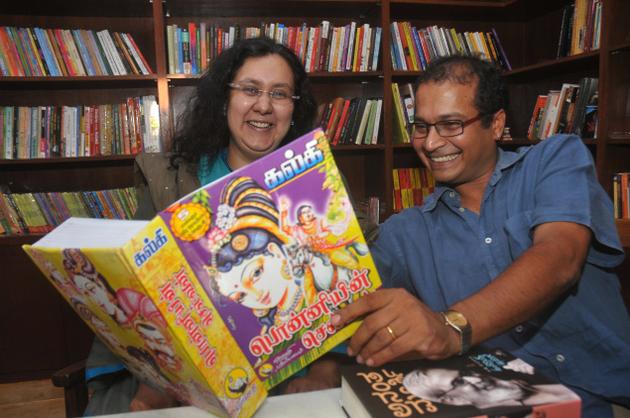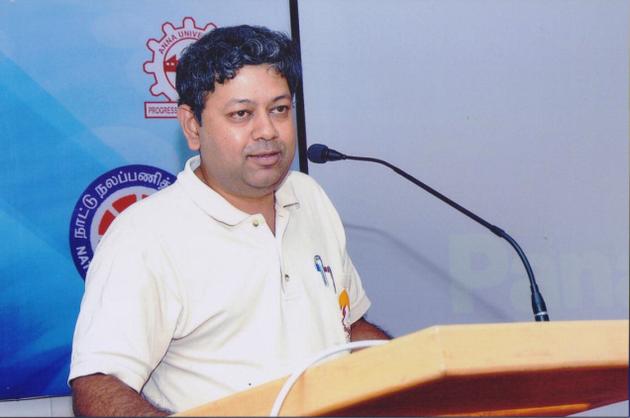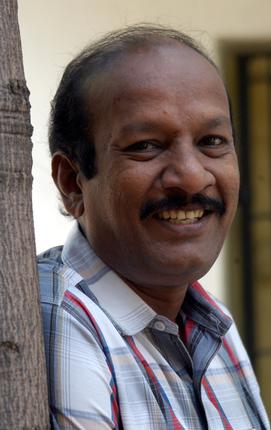
What does today’s Tamil reader look for in books? Why isn’t Tamil fiction doing so well, while its English counterpart seems to be thriving? Lakshmi Krupa speaks to publishers in the city to understand what works and what doesn’t when it comes to Tamil books
Think Tamil literature. Think rich texts. We know we carry with us a treasure trove from our past, from the Sangam period to the works of Kalki, fromThirukkural to the works of bhakti saints… But what of our present and the future? Even as poets continue to push the boundaries finding ways to give voice to their struggles, Tamil fiction is a trickier proposition, say publishers.

Badri Seshadri of New Horizon Media, says, “There are three scenarios currently in which Tamil fiction works. First is historical fiction which continues to sell well year after year. Here we see constant demand pouring in for Kalki’s Ponniyin Selvan. Then there are writers Sandilyan and Balakumaran. Second, when a celebrity writes a book and a considerable amount is spent on the PR work, it helps bolster sales. Finally, when an author wins the Sahitya Akademi award, there is a demand for his/her work — provided it’s rightly priced. The following month when we have the Chennai Book Fair we can definitely see close to 1,000 copies move. In the general Tamil publishing scene, for a long time now nothing new has been working in fiction.”

At the city-based Manimekalai Prasuram, the trend has always been to look for new and amateur writers. “We are not in search of bestsellers,” says Ravi Tamilvanan, Managing Director, Manimekalai Prasuram. “We have not been focussing much on fiction. Instead, we find that self-help books are doing well. We currently have over 10,000 titles on sale,” he adds. Translated works of motivational speakers such as Robin Sharma are Manimekalai’s specialty. “The one good thing that Tamil books have going for them here is that the government procures copies by the thousand for distribution to several libraries so that people from economically weaker sections have access to them as well. The Anna Centenary Library in the city too has a good collection to which it adds new titles every year!” The government prefers books that promote ‘madha nallinakkam’ (religious harmony), biographies of great leaders, etc, however, it stays away from those that spread superstitions, Tamilvanan says.Padikaadha Medhai Kamarajaridam Padikka Vendiyavai by Neelam Madhumayan, for instance, is a book of the publisher that has been doing really well in recent times. Indira Soundarrajan and Balakumaran are the other hot favourites, Tamilvanan reveals. “There are no Chetan Bhagats in Tamil. There are some, like my brother (Lena Tamilvanan) who writes for youngsters, but they are not young themselves,” he smiles. Manimekalai Prasuram’s books travel across the world, with its managing director, from the northern parts of Sri Lanka to the U.S. on July 4 when the Tamizhar Tiruvizha takes place there. It is also among the few publishing houses that has in its hold 450 titles written by Sri Lankan Tamils.

“Indira Parthasarathy Katturaigal, a book on how to write screenplays, is one of our popular recent releases,” says Sethu Chockalingam, proprietor, Kavitha Publication. “We have launched 84 new books and 200 reprints this new year,” he adds. Of them, ten have been the popular children’s writer Vaandu Mama’s new books! The publishing house is also working on translations of English classics. “Valmiki Aruliya Ramayanam with art by Maniam Selvan is another top seller this year,” he says, adding we are now readying a similar book on the Mahabharata.
“Neeya Nana Gopinath is among the top writers whose books see a lot of sales. We are talking tens of thousands (around 50,000 to be approximate), followed by Irai Anbu,” says Seshadri. “We have no number three unfortunately. We had Jaggi Vasudev’s books and titles such as Manase Relax Pleasethat came out a few years ago enjoying a lot of popularity.” Cartoonist Madhan is another top seller these days. “His Kimu Kipi (a history book) is doing really well. There is no runaway winner today. None of our titles do upwards of 20,000 copies sales,” Seshadri adds, “Today, no capable Tamil writer wants to focus only on Tamil writing, and understandably so. They all have something else to do, and write only in their spare time. Second, more and more talent from Tamil is now veering towards writing in English.” So what keeps these publishers going? “We still think Tamil publishing is viable. Beyond publishing we are looking at general Tamil book retail. Also, the non-shop, Internet/phone platform throws up a lot of opportunities that can be profitable! Amazon’s Kindle doesn’t support Tamil and we see an opportunity there too. We will work on creating a strong Indian language e-platform as well.”
In a bid to give the Tamil publishing industry a fillip, Tamilvanan offers a few pointers: “People could consider gifting someone a Tamil book. In schools, we hope the library hour is restored. This was the hour we all looked forward to as students and we hope schools will promote quality Tamil books among students. We also hope the government will find ways to recognise publishers and their contributions to the language with awards, the way it recognises artistes with a Kalaimamani.” As in the English industry, the Tamil publishers too are looking to innovate. For instance, Manimekalai has an alternative for those interested in self-publishing. The ‘ezhuthalar – pathipalar mudhaleetu thittam’ is a scheme wherein you can pay the publisher to print 1,000 copies. “The writer can handle the sales of 300 copies, through a book launch and other sources, and we will handle the other 700 through our network,” he says.
source: http://www.thehindu.com / The Hindu / Home> Features> MetroPlus / by Lakshmi Krupa / Chennai – April 07th, 2014